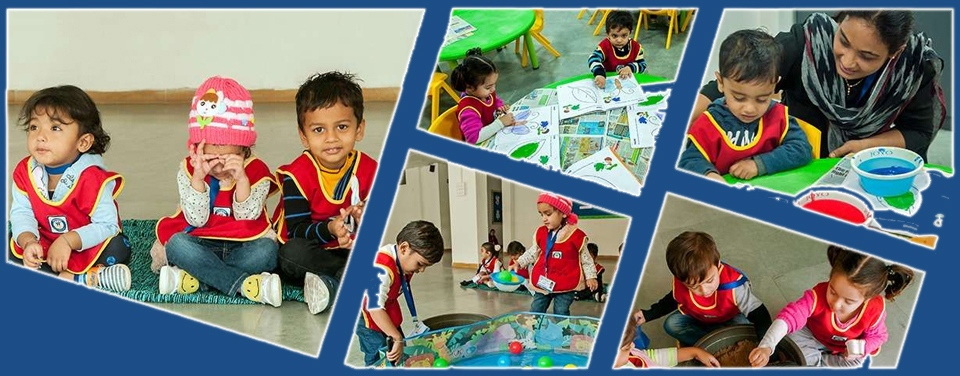There are many questions in a parent’s mind before enrolling their little one in a preschool. First and foremost is “Does the child need a school”, sometimes the other question that pops up is why does she need a preschool? Well, the answer is that good preschools in Ahmedabad prepare young toddlers for their future academic and social success.

Let’s share some major benefits for your toddler to join a preschool.
1. Children learn to interact with strangers.

Children in a playschool or a day-care learn to follow instructions, mingle with people other than their mothers or fathers. So they get in the habit of talking and discussing with teachers in the school. They learn to share, follow instructions and hence, a foundation is laid, which will be beneficial for the child when he or she enrols for formal education.
2. Preschool offers a balanced curriculum.

As the child becomes independent and starts to learn new things, parents are often confused about what to teach the child? Sometimes due to the influence of family and friends, it becomes difficult for the parents to create a balanced curriculum at home.
3. Preschool prepares them for admissions in good schools of Ahmedabad

The curriculum in an ideal preschool prepares children for admissions to other leading schools in Ahmedabad like Zebar School and Udgam School. However, if a parent wishes to enrol the child in an International school, then also the kind of exposure the child get he or she can easily get into any leading CBSE or IB school in Ahmedabad.
4. Personal attention in preschool.

Good preschools ensure that toddlers feel cared for and secure with teachers.
An idea preschool has two teachers in each class, and each child is provided with personal attention. Activities like circle time, storytelling, reading time give the child plenty of opportunities to interact with teachers and classmates. This helps in creating a close personal rapport with each child in their class.
5. Toddlers learn Social and Emotional Skills in a preschool.

Children between the ages of 2 to 6 learn social skills and emotional self- control through experience. Hence our expert teachers and counsellors in the school continually guide young children in school to control their emotions and manage their anger. The professionally qualified counsellors create activities for “teachable moments” which help young children learn to handle frustrations or anger. Without insulting the child, they make them realize the impact of their good or bad behaviour on their friends.
6. Structured Environment in a Preschool helps children to adjust to Big Schools.

Pre-schoolers learn discipline, orderliness and are more confident if they are raised in a structured environment. Similarly, if a toddler attends an ideal preschool having a structured environment wherein there is appropriate guidance provided to them at every step helps them bloom in big schools.
7. Children learn about real-life situations in a Preschool.

An ideal preschool usually teaches children to learn to take care of themselves and others through the planned activities in the school. Events like ‘No-flame Cooking Sessions’ engage them in ‘real work’ and they learn to appreciate food and the work done by others. Similarly, the food cooked by them is offered to the Vice-Principal and heads of the school. This small gesture makes them understand basic Indian Traditional values like ‘Sharing and Respecting Elders’.
8. Preschool teaches toddlers to be independent and socially responsible.

In preschool, children are taught about basic hygiene, cleanliness and social responsibility as a future citizen of this country. ‘Clean-Up time’ is an everyday activity in which children clean the classrooms and put their toys in place after playing in school. Such activities make them responsible for the cleanliness and things around them. They learn how to keep their surroundings at home or in public places clean.
9. Children develop language skills in preschool

During the toddler years, a child’s vocabulary proliferates. The child can speak small sentences, and after that, he can quickly start conversing using long and complex sentences. This is a crucial language milestone for your child. So choose a school which has well-qualified teachers who speak fluent English and provide language learning opportunities to toddlers. Children should be engaged in exciting word games and reading games, storytelling, role-play and puppet activities apart from the regular poem and reading sessions with the teachers.
10. Preschool encourages out of the box thinking in toddlers

A preschool is also a place which nurtures a child’s curiosity. In an ideal preschool or good preschool teachers observe, ask questions and listen to children’s answers during their activity sessions. To nurture their curiosity and ignite a love for learning, teachers design activities for the children. Activities like ‘Me on The Map’, Special Assemblies and Hands-On activities trigger the child’s critical thinking and higher-order thinking skills. An ideal preschool provides plenty of chances to the little ones for discovery and self-learning.
11. Preschools offer Maths skills.

To prepare toddlers and young children for the demands of formal schooling, Preschools offer a wide variety of games and activities that help the young children grasp the pre-math skills.
Children are exposed to matching games, sorting games, counting games as well as board games. These games help in a basic understanding of numbers, categories and sequences which helps in creating interest in Mathematics as a subject.
12. Preschools help in the development of fine motor skills.

Motor skills in preschool are developed through threading beads, scissors cutting, lacing and pom-pom activities. These activities improve hand-eye coordination and also enhance the pincer grip of the students.
So choose a preschool wisely as it shall lay the foundation for the academic success of your child.




